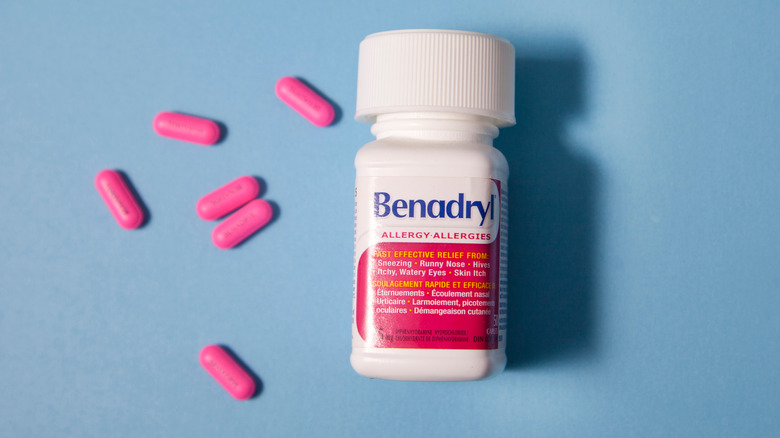When dealing with ruminating thoughts fueled by anxiety, it’s understandable one would want to seek out a means of relief to help slow things down. Because those looping thoughts can often keep us awake at night, over-the-counter medications can be an appealing option to help ease stress or panic to relax into sleep. With over-the-counter (OTC) supplements such as valerian root, GABA, and licorice root being promoted as natural remedies for anxiety (via The Recovery Village), it’s easy to think that other readily available medications such as antihistamines like Benadryl could also help ease anxiety symptoms.
Benadryl, or diphenhydramine, hinders the body’s natural histamine immune system response to help treat symptoms of an allergic reaction such as teary eyes, sneezing, and itching (via Drugs.com). In some cases, it has been used to manage motion sickness and promote sleep. Because one of the drug’s main side effects is drowsiness, one must wonder whether Benadryl is safe to use for treating symptoms of anxiety.
Side effects of Benadryl

According to Verywell Mind, an adult dose of Benadryl between 25 to 50 milligrams can produce effects as soon as 15 minutes to a half-hour after taking. According to PsychCentral, Benadryl is intended for short-term usage and is not considered a long-term course of treatment for sleep issues or anxiety symptoms. There is no research that suggests Benadryl lessens feelings of panic in humans. Additionally, there have been no safety trials to examine the long-term effects of its continued use.
Side effects of Benadryl can include drowsiness, dizziness, headache, abdominal pain, constipation, blurred vision, and sexual dysfunction, and more (via PsychCentral). Like many medications, improper use can lead to overdose. Be sure to follow the directions listed on the label. More severe side effects include anemia, seizures, tremors, hallucinations, and loss of muscle control. In addition, some people may experience a potential mental health side effect that can be characterized as a stimulating effect, often exacerbating feelings of anxiety.
Instead of using Benadryl to treat anxiety symptoms, medical experts suggest alternate treatment options. As suggested by Verywell Mind, consider speaking to your doctor or mental health professional. In addition, certain forms of therapy or anti-anxiety medications may prove helpful in managing symptoms.
If you or someone you know is struggling with mental health, please contact the Crisis Text Line by texting HOME to 741741, call the National Alliance on Mental Illness helpline at 1-800-950-NAMI (6264), or visit the National Institute of Mental Health website.




